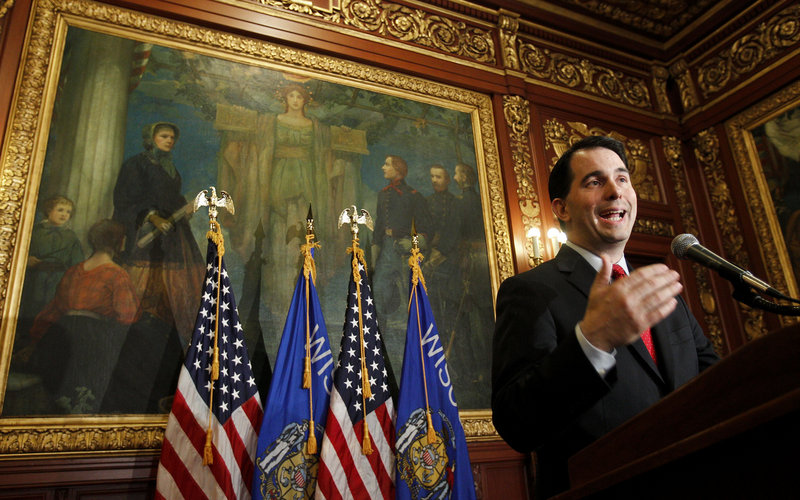MADISON, Wis. — Gov. Scott Walker’s administration took steps Monday to adjust state workers’ paychecks to reflect a new collective bargaining law, while the state Justice Department asked a court to agree that the law was in effect and to stop cases that attempt to block its implementation.
Meanwhile, the Wisconsin school board association advised districts to hold off on any more contract talks given the ongoing uncertainty over whether the law is in effect. Many school districts, counties and municipalities had been rushing to reach deals before the law that takes away nearly all public employees’ bargaining rights kicked in.
Republican lawmakers pushed through passage of the law earlier this month despite massive protests that drew up to 85,000 people to the state Capitol and a boycott by Democratic state senators. Opponents immediately filed a series of lawsuits, and a hearing on one was scheduled for today. The judge in that case had issued a restraining order barring Democratic Secretary of State Doug La Follette from publishing the law, typically the last step before it takes effect.
But at the request of a Republican Senate leader, the nonpartisan Legislative Reference Bureau posted the law on the Legislature’s website Friday. Walker’s administration and the Justice Department, led by Republican Attorney General J.B. Van Hollen, said the posting put the law into effect Saturday and work to implement it would begin immediately.
Along with removing most of public employees’ collective bargaining rights, the new law requires them to pay more for their health insurance and pensions, which amounts to an 8 percent pay cut.
Walker’s top aide, Mike Huebsch, said the administration was preparing a computer program to begin the new deductions and stop deduction of union dues on paychecks that state workers will receive April 21.
Also Monday, the state Department of Justice asked for permission to withdraw its appeal of the restraining order barring La Follette from publishing the law. It said the order is now moot since the law was enacted without the secretary of state’s involvement.
But La Follette, the head of the office that posted the law, the Madison city attorney and others maintained the law is not in effect until the secretary of state acts.
Given the difference of opinions, the Wisconsin Association of School Boards told districts that are still negotiating with teachers not to take any official action until the courts resolve the dispute.
“Because we have a difference of opinion within the state administration, the safest place to be is to not enter an agreement at the present time,” said Bob Butler, an attorney for the school boards association.
Send questions/comments to the editors.



Success. Please wait for the page to reload. If the page does not reload within 5 seconds, please refresh the page.
Enter your email and password to access comments.
Hi, to comment on stories you must . This profile is in addition to your subscription and website login.
Already have a commenting profile? .
Invalid username/password.
Please check your email to confirm and complete your registration.
Only subscribers are eligible to post comments. Please subscribe or login first for digital access. Here’s why.
Use the form below to reset your password. When you've submitted your account email, we will send an email with a reset code.